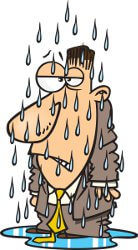Affect vs Effect
What Is the Difference?
"Affect" and "effect" are two words that are often confused in the English language. Many people do not know how to use them correctly. Even native English speakers sometimes mix these up in their writing.
Click Here for Step-by-Step Rules, Stories and Exercises to Practice All English Tenses
The problem is that "affect" and "effect" are usually pronounced the same. They are homophones. Homophones are words that sound the same but have different meanings.
It is important that you know their meanings and use them correctly in your writing!
These two words can have a big effect on your writing. Using them incorrectly will affect the meanings of your sentences and confuse your readers.
Most of the time, you will follow these rules:
Affect =
verb (to influence)
Effect = noun (the result)
Effect = noun (the result)
Examples:
- The rain might affect
their picnic.
(The rain might influence/change their picnic.)
- The effect
of the rain was I got wet.
(The result of the rain was I got wet.)

- The noise affected
my sleep.
(The noise influence my sleep.)
- The effect
of the noise was a lack of sleep.
(The result of the noise was a lack of sleep.)

Affect
"Affect" is most commonly used as a verb meaning- to influence
- to change something or someone
- to cause strong emotions
It is a transitive verb. This means it always takes a direct object.
Incorrect:
- The rain will affect.
(no direct object)
- The rain will affect
our picnic.
(picnic = direct object)
The word "affect" is an action. This is a good way to remember its use as a verb.
Affect = Action
Examples:
- The hot days affect
the flowers in my garden.
- Your homework affects
your final grade.
- The bad news affected
everyone.
- This evidence will affect his
criminal trial.
- My back pain is affecting
my ability to sleep.
- Smoking cigarettes has affected my health.

Effect
"Effect" is most commonly used as a noun meaning "the result or consequence."Examples:
- The effect
of earning a college degree is a better job.
- Two effects
of drinking alcohol are blurred vision and loss of memory.
- Higher taxes have an effect on
everyone.
- He stopped smoking cigarettes because of the negative effects.
- The snow had a negative effect on my mood.

"Effect" is also sometimes used as a noun to talk about an image or sound created in movies, television, or music.
- special effects
- visual effects
- sound effects
Examples:
- The special
effects of the movie were amazing!
- The animal sound
effects made me feel like I was in the forest.
- I enjoyed the visual effects in the movie, "Star Wars."

Less common uses of "affect" and "effect"
Most of the time, you will use "affect" as a verb and "effect" as a noun.However, there are less common uses of the words.
Doctors and psychiatrists sometimes use "affect" as a noun when referring to mood or emotions. Most people do not use this in everyday conversation.
Examples:
- She showed an angry affect.
- The patient displayed a happy affect.
- The drugs produced an angry affect in the patient.
Sometimes "effect" is used as a verb meaning "to bring about" or "to accomplish." Again, most people do not use this is everyday conversation.
Examples:
- The new mayor hopes to effect
positive changes in the city.
(to accomplish positive changes)
- The police officer will effect the
arrest of the thief.
(to bring about the arrest)
Although you should be aware of these uses in case you see them in writing, please remember that these are very rare uses of "affect" and "effect."

These were the differences of affect and effect. Now that you understand, it is time to practice! Get our ESL Books.
Get Updates, Special Offers, and English Resources
Download your FREE GIFT (the first two chapters of
English Short Stories Book and Workbook)
as soon as you join!

By submitting your email, you consent to receiving updates and newsletters from us and to the sharing of your personal data with third parties for the purposes of sending you communications. We will not spam you. You can unsubscribe at any time. For more information, please see our privacy policy.





